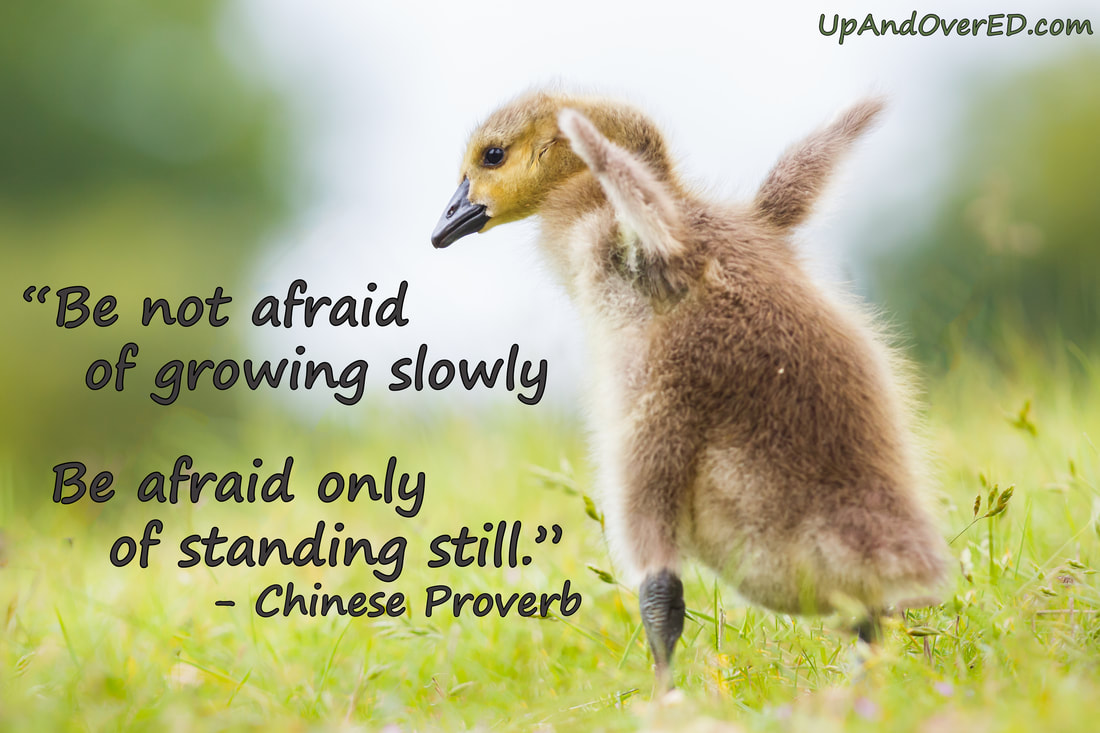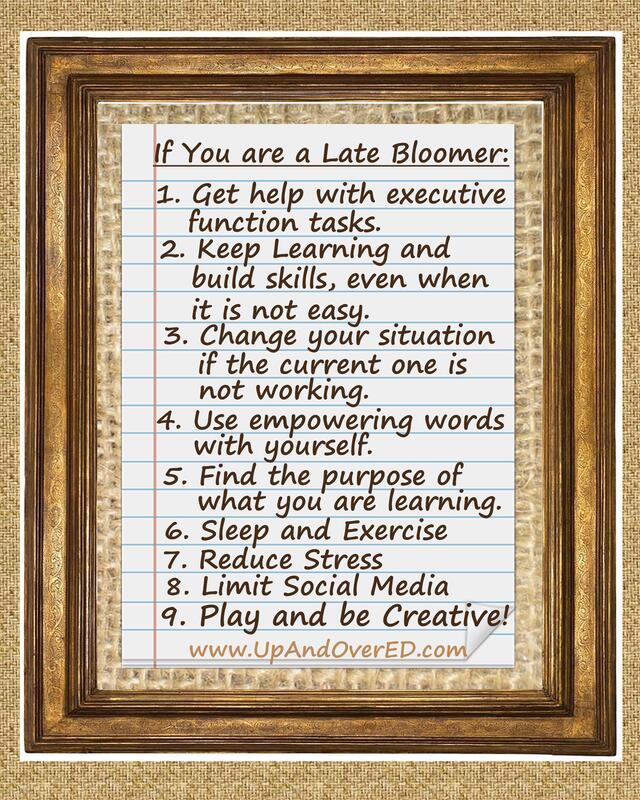| We live in a world obsessed with early achievement. We read articles in Forbes and Times about the “Top 30 under 30” super achievers. We applaud seventeen year old Malala Yousafzai, the youngest Nobel Prize winner. We are awed by young tech founders like Mark Zuckerberg of Facebook and Evan Spiegel of Snapchat. Parents pay $20,000 to $40,000 a year for |
full immersion second language courses and rigorous academic curriculums – for their preschoolers.
There is nothing inherently wrong with early success. But my concern is that because everyone learns and grows at different rates, with the societal emphasis on early achievement, we leave behind a large group of children who just need more time to bloom. Many of these late blooming students lose hope, and we have to ask ourselves – what can we do?
There is nothing inherently wrong with early success. But my concern is that because everyone learns and grows at different rates, with the societal emphasis on early achievement, we leave behind a large group of children who just need more time to bloom. Many of these late blooming students lose hope, and we have to ask ourselves – what can we do?
| I am the mother of a late bloomer. My son did not talk until he was two years old, and he did not read or write until he was ten. He was your classic (and normal) hyperactive boy with dyslexia. I was parenting and homeschooling this young child over twenty years ago, and part of what gave me patience to wait for my son to bloom on his own time schedule was reading the book Better Late than Early by Dr. Raymond Moore. |
Moore’s research proposed that children are not psychologically ready for formal learning until ages eight to ten, and he suggested waiting for formal study until students had the maturity and logic skills necessary so they did not become frustrated and discouraged from trying to handle material they were simply not ready to understand.
But just because my son couldn’t read did not mean he was not exposed to books. As a family, we read out loud every night. We started with picture books, but soon we were reading the Little House on the Prairie series (all of them) the Chronical of Narnia series (all of them), plus other classics like the Hobbit and Treasure Island. My son built things, put things together and took them apart, cooked, gardened, helped his Dad at work and was learning all the time. He enjoyed fixing things and was often tightening screws, looking at the plumbing under the sink and helping his dad work on motorcycle engines. He was learning to love learning, he was gaining skills, and he was laying the ground work so that when the time came, he would be ready to bloom.
But just because my son couldn’t read did not mean he was not exposed to books. As a family, we read out loud every night. We started with picture books, but soon we were reading the Little House on the Prairie series (all of them) the Chronical of Narnia series (all of them), plus other classics like the Hobbit and Treasure Island. My son built things, put things together and took them apart, cooked, gardened, helped his Dad at work and was learning all the time. He enjoyed fixing things and was often tightening screws, looking at the plumbing under the sink and helping his dad work on motorcycle engines. He was learning to love learning, he was gaining skills, and he was laying the ground work so that when the time came, he would be ready to bloom.
| According to Rich Karlgaard, author of Late Bloomers: The Power of Patience in a World Obsessed with Early Achievement, “a late bloomer is a person who fulfills their potential later than expected; they often have talents that aren’t visible to others initially. The key word here is expected. And they fulfill their potential frequently in novel and unexpected ways, surprising even those closest to them.” |
He goes on to say, “Think about a starting point for a late bloomer. In all probability, his or her talents and passions were overlooked by a culture and educational system that measures for a cruelly narrow range of skills. It closed off the person’s paths of discovery and encouragement and potential. It did not open the doors to a successful future for them because it didn’t even see them.”
As a tutor, I work with a lot of these unseen students, and it is heartbreaking to hear and see the discouragement and lack of hope many of them suffer. One of the challenges for many students is that the prefrontal cortex in the frontal lobe of the brain is the last part of the brain to fully develop, and this often does not happen until an adult is in his or her mid-twenties. This part of the brain is responsible for executive function with includes: organizing, planning, problem solving, memory recall and attention allocation. Executive function has nothing to do with talent, IQ or potential, but without it, it becomes difficult for a person to fully bloom.
Is there hope? Yes!
Here are Nine Ways You Can Help Late Bloomer Students:
1. Help with tasks that require executive function.
While waiting for a child to fully bloom, parents and others can step in and assist with tasks that require executive function until a youth is ready to take on more of those activities his or herself. With my son, I coached and tutored him through high school, and when he started at Cuesta College, I helped him with time management and planning his classes, and I tutored him through many of the classes as well by helping him organize his class notes in a way that he could learn the information. This allowed him to continue to gain skills that he could not have done without help. He slowly acquired basic writing skills, the ability to understand math patterns, and knowledge of history, art, science and economics through his high school and college classes. These skills would provide pivotal when the time came when he did bloom.
2. Help your child to keep learning.
Many students have difficulty in loud and distracting classroom environments. They may need a parent or another person to reteach material they missed in class. Other students have difficulty reading, and they may need material summarized or outlined for them so they can better organize the material in their brains. Some students process by talking and need a listening ear so they can talk over the material they are learning. It is important that late bloomers keep learning.
As a tutor, I work with a lot of these unseen students, and it is heartbreaking to hear and see the discouragement and lack of hope many of them suffer. One of the challenges for many students is that the prefrontal cortex in the frontal lobe of the brain is the last part of the brain to fully develop, and this often does not happen until an adult is in his or her mid-twenties. This part of the brain is responsible for executive function with includes: organizing, planning, problem solving, memory recall and attention allocation. Executive function has nothing to do with talent, IQ or potential, but without it, it becomes difficult for a person to fully bloom.
Is there hope? Yes!
Here are Nine Ways You Can Help Late Bloomer Students:
1. Help with tasks that require executive function.
While waiting for a child to fully bloom, parents and others can step in and assist with tasks that require executive function until a youth is ready to take on more of those activities his or herself. With my son, I coached and tutored him through high school, and when he started at Cuesta College, I helped him with time management and planning his classes, and I tutored him through many of the classes as well by helping him organize his class notes in a way that he could learn the information. This allowed him to continue to gain skills that he could not have done without help. He slowly acquired basic writing skills, the ability to understand math patterns, and knowledge of history, art, science and economics through his high school and college classes. These skills would provide pivotal when the time came when he did bloom.
2. Help your child to keep learning.
Many students have difficulty in loud and distracting classroom environments. They may need a parent or another person to reteach material they missed in class. Other students have difficulty reading, and they may need material summarized or outlined for them so they can better organize the material in their brains. Some students process by talking and need a listening ear so they can talk over the material they are learning. It is important that late bloomers keep learning.
3. Look for a new situation if the current one is not working.
Susan Cain, author of Quiet: The Power of Introverts in a World that Can’t Stop, says, “Hardy people bloom in any pots, others will only bloom in certain pots.”
My eldest daughter is extremely introverted and would have really struggled in a classroom setting. Homeschooling was the right choice and “right pot” for her.
Karlgaard suggests, “Quit when something is not working…For every moment we double down on something that’s not working, we are forgoing other potentially valuable opportunities… the real waste is not sacrificing our past by quitting a failing endeavor. It is sacrificing our future by not pursuing something better.”
4. Use words that empower them and build confidence
It is more helpful to say, “This is hard, but you can figure this out” than to say, “This isn’t hard. Why can’t you do this?” Words do matter. I often say to my tutoring students, “You can do this, and I will show you how.”
5. Find a purpose for what they are learning.
When my math students ask me why they are studying algebra, I sometimes respond with a question asking if they want to plan a big project (like a wedding) someday. Most say yes. I then explain that a big event involves taking a big idea and breaking it into a lot of small pieces (like guests, food, location, music), working on each one separately and then putting it all back together into a satisfying whole. I then explain that the thinking skills needed for that are exactly the ones we use when we study algebra. Algebra teaches us to think! If students find a good reason for learning, then they will try harder and focus more on the task.
Susan Cain, author of Quiet: The Power of Introverts in a World that Can’t Stop, says, “Hardy people bloom in any pots, others will only bloom in certain pots.”
My eldest daughter is extremely introverted and would have really struggled in a classroom setting. Homeschooling was the right choice and “right pot” for her.
Karlgaard suggests, “Quit when something is not working…For every moment we double down on something that’s not working, we are forgoing other potentially valuable opportunities… the real waste is not sacrificing our past by quitting a failing endeavor. It is sacrificing our future by not pursuing something better.”
4. Use words that empower them and build confidence
It is more helpful to say, “This is hard, but you can figure this out” than to say, “This isn’t hard. Why can’t you do this?” Words do matter. I often say to my tutoring students, “You can do this, and I will show you how.”
5. Find a purpose for what they are learning.
When my math students ask me why they are studying algebra, I sometimes respond with a question asking if they want to plan a big project (like a wedding) someday. Most say yes. I then explain that a big event involves taking a big idea and breaking it into a lot of small pieces (like guests, food, location, music), working on each one separately and then putting it all back together into a satisfying whole. I then explain that the thinking skills needed for that are exactly the ones we use when we study algebra. Algebra teaches us to think! If students find a good reason for learning, then they will try harder and focus more on the task.
| 6 Make sure they get enough sleep and exercise. Sleep allows the brain to reset the brain connections that are important for memory and learning. Many students are chronically sleep deprived, and this has a detrimental effect on their ability to learn. Cardiovascular exercise is important, too, and boosts the oxygen supply to the brain and increases brain volume. 7. Reduce Stress In the past fifteen years, depression has doubled and suicide rates have tripled among American college students. The American College Health Association found that 54 percent of college students said they had felt overwhelming anxiety in the previous twelve |
months. Stress has a real impact on a student’s brain and health. Having quiet time, a manageable work load and time out in nature can help.
8. Limit or eliminate social media
Social media has been shown to increase stress and depression in teens as they compare themselves to what they think are their friends’ perfect lives. The time can be better spent building their own unique skills and using their own creativity.
9. Let kids (and teens!) play for fun
It used to be that you could just enjoy a game of pick up baseball with friends in your neighborhood cul-de-sac, but now kids are being driven to team sports at earlier and earlier ages with parents who push and insist on great plays and winning games. Music, too, has become a stress with some students wondering if they should keep playing their instrument if they can’t be first chair in the youth orchestra group. A lot of good things happen to the brain when kids are allowed to use their creativity and just play, and they build skills and patterns they will use later in life.
8. Limit or eliminate social media
Social media has been shown to increase stress and depression in teens as they compare themselves to what they think are their friends’ perfect lives. The time can be better spent building their own unique skills and using their own creativity.
9. Let kids (and teens!) play for fun
It used to be that you could just enjoy a game of pick up baseball with friends in your neighborhood cul-de-sac, but now kids are being driven to team sports at earlier and earlier ages with parents who push and insist on great plays and winning games. Music, too, has become a stress with some students wondering if they should keep playing their instrument if they can’t be first chair in the youth orchestra group. A lot of good things happen to the brain when kids are allowed to use their creativity and just play, and they build skills and patterns they will use later in life.
Are there benefits to being a late bloomer? Yes!
Rich Karlgaard lists several strengths of Late Bloomers:
Rich Karlgaard lists several strengths of Late Bloomers:
| 1. Curiosity: Late bloomers retain more of their youth curiosity. Early bloomers suppress childhood curiosity in favor of focus. A late bloomer in his or her mid-twenties now has the executive function to give that curiosity direction. The more curious one becomes, the more motivation one has, and motivation increases the desire to learn which increases curiosity. |
2. Compassion: Late bloomers are often able to put themselves in someone else’s shoes because they have already walked a difficult road, and they are more likely to offer a helping hand.
3. Resilience: Late bloomers deal with more adversity and have been knocked down by life, and they find they come back stronger.They also have learned that when something fails, it often is just a chance for redirection towards something even better.
When my son finished Cuesta College with an A.S. in Automotive Technology, he got a job as an auto tech at a local automotive repair shop, and I heaved a sigh of relief. It had taken a lot of effort, but he had the skills he needed to support himself and a job where he was happy doing what he was good at. And then – when he turned twenty-four, his brain really, truly bloomed. He announced that he was going back to college, and within two years he had earned his Automotive Management Bachelor of Science Degree from Ferris State University. I was amazed to discover he was writing fifty page research papers without help. A few weeks after graduation, he accepted a position in the corporate division of a large auto manufacturer. He moved to another state, bought a house within a year and is now a product engineer traveling around the country and internationally problem solving and trouble shooting. He is doing what he loves and using skills he began developing during childhood. He has bloomed in ways I could never have imagined.
Had he not had the base skills from the tutoring he received, he could have not made the jump when his brain was finally ready to go. My encouragement to parents is to help your kids gain skills and knowledge along the way and provide executive function time-management and organizational assistance when they can’t do those things for themselves. Most of all, have patience and have hope.
Wishing you joy on the journey,
Debra Newby
www.UpandOverED.com
Debra Newby is a credential teacher in biology and chemistry, an academic tutor, a life coach and a parent mentor on California’s Central Coast. If you would like more information on the ways she can help you navigate the adventure of raising children, please contact her at [email protected]
3. Resilience: Late bloomers deal with more adversity and have been knocked down by life, and they find they come back stronger.They also have learned that when something fails, it often is just a chance for redirection towards something even better.
When my son finished Cuesta College with an A.S. in Automotive Technology, he got a job as an auto tech at a local automotive repair shop, and I heaved a sigh of relief. It had taken a lot of effort, but he had the skills he needed to support himself and a job where he was happy doing what he was good at. And then – when he turned twenty-four, his brain really, truly bloomed. He announced that he was going back to college, and within two years he had earned his Automotive Management Bachelor of Science Degree from Ferris State University. I was amazed to discover he was writing fifty page research papers without help. A few weeks after graduation, he accepted a position in the corporate division of a large auto manufacturer. He moved to another state, bought a house within a year and is now a product engineer traveling around the country and internationally problem solving and trouble shooting. He is doing what he loves and using skills he began developing during childhood. He has bloomed in ways I could never have imagined.
Had he not had the base skills from the tutoring he received, he could have not made the jump when his brain was finally ready to go. My encouragement to parents is to help your kids gain skills and knowledge along the way and provide executive function time-management and organizational assistance when they can’t do those things for themselves. Most of all, have patience and have hope.
Wishing you joy on the journey,
Debra Newby
www.UpandOverED.com
Debra Newby is a credential teacher in biology and chemistry, an academic tutor, a life coach and a parent mentor on California’s Central Coast. If you would like more information on the ways she can help you navigate the adventure of raising children, please contact her at [email protected]





 RSS Feed
RSS Feed
